Strategy Management: Ryanair's Analysis - Mid-Module Assignment
VerifiedAdded on 2023/01/10
|10
|2726
|1
Report
AI Summary
This report provides a strategic analysis of Ryanair, a leading low-cost carrier in Europe, focusing on its strategic resources, capabilities, and competitive advantages. It examines Ryanair's threshold and distinctive resources, including its leadership, standardized fleet, and low-cost strategy. The analysis highlights the airline's cost leadership approach, emphasizing its no-frills service, ancillary revenue streams, and efficient online booking system. Furthermore, the report assesses the sustainability of Ryanair's competitive advantage, considering factors such as its large business size, effective leadership, and embedded cost-conscious culture. The VRIO analysis identifies both inimitable and imitable aspects of Ryanair's strategy, including its low-cost technology and leadership, while also addressing potential challenges and opportunities through a SWOT analysis. The report concludes by recommending strategies for Ryanair to leverage its customer base, enhance customer relationships, and maintain its competitive edge in the dynamic airline industry. Desklib provides access to similar solved assignments and past papers for students.
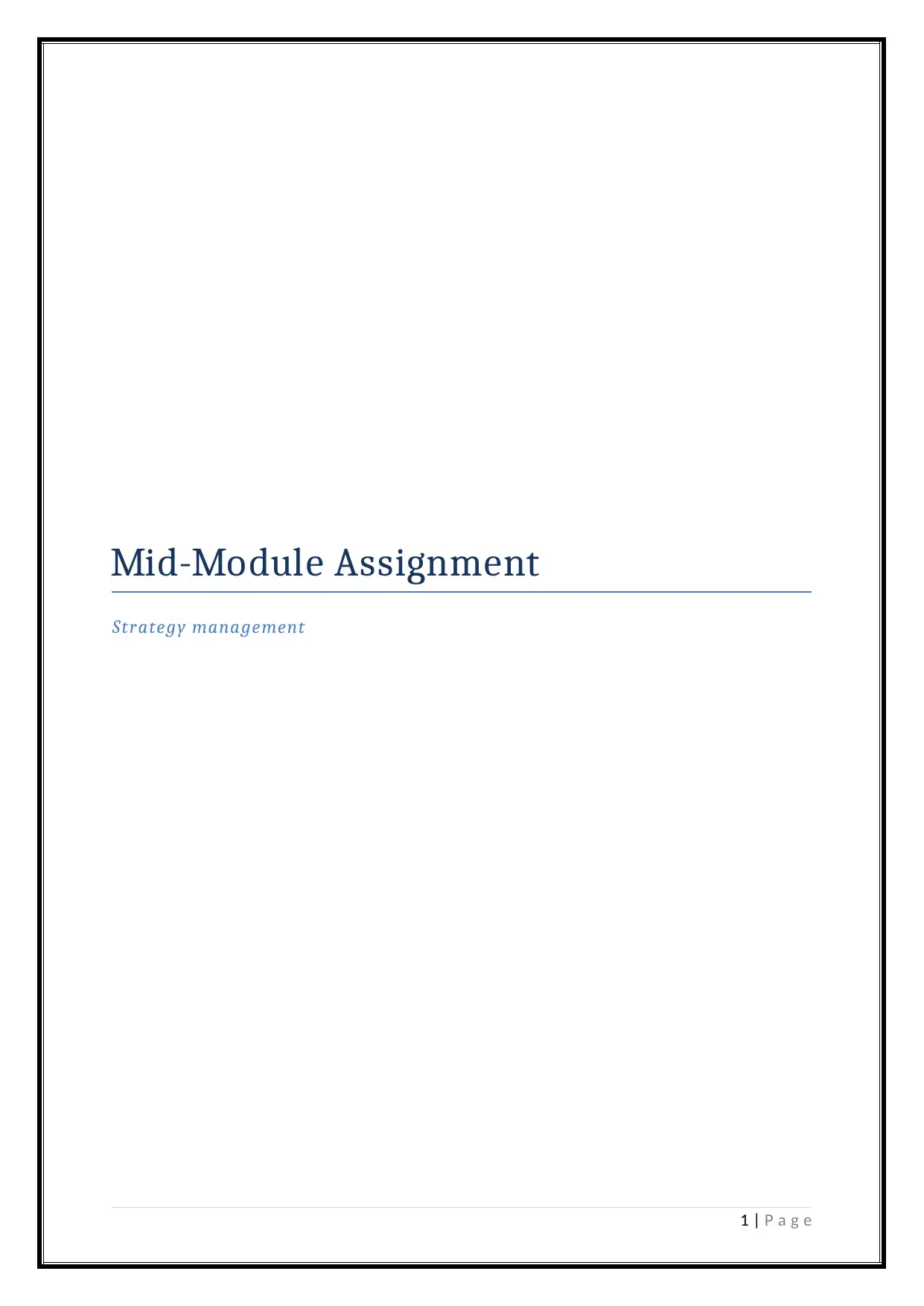
Mid-Module Assignment
Strategy management
1 | P a g e
Strategy management
1 | P a g e
Paraphrase This Document
Need a fresh take? Get an instant paraphrase of this document with our AI Paraphraser
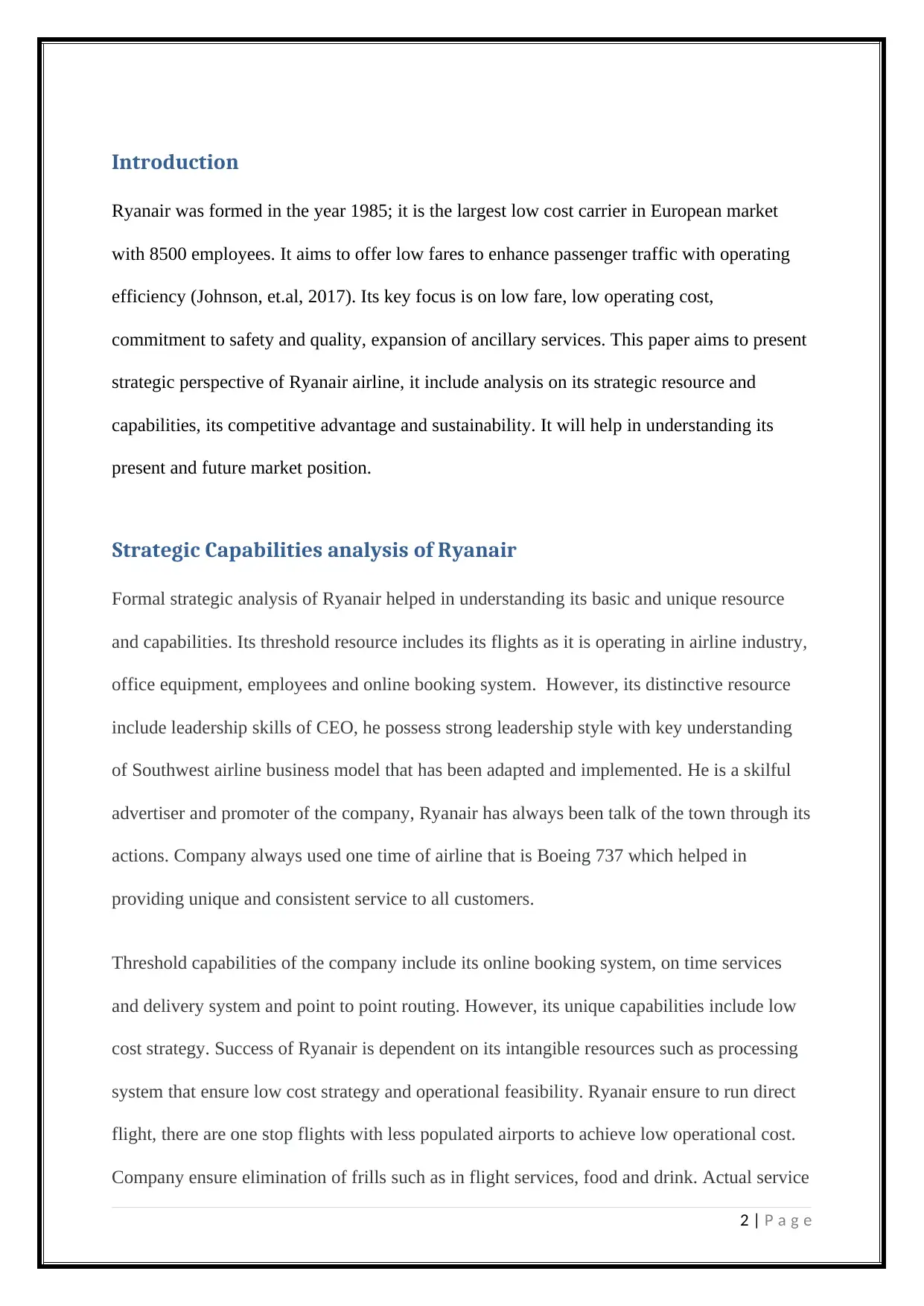
Introduction
Ryanair was formed in the year 1985; it is the largest low cost carrier in European market
with 8500 employees. It aims to offer low fares to enhance passenger traffic with operating
efficiency (Johnson, et.al, 2017). Its key focus is on low fare, low operating cost,
commitment to safety and quality, expansion of ancillary services. This paper aims to present
strategic perspective of Ryanair airline, it include analysis on its strategic resource and
capabilities, its competitive advantage and sustainability. It will help in understanding its
present and future market position.
Strategic Capabilities analysis of Ryanair
Formal strategic analysis of Ryanair helped in understanding its basic and unique resource
and capabilities. Its threshold resource includes its flights as it is operating in airline industry,
office equipment, employees and online booking system. However, its distinctive resource
include leadership skills of CEO, he possess strong leadership style with key understanding
of Southwest airline business model that has been adapted and implemented. He is a skilful
advertiser and promoter of the company, Ryanair has always been talk of the town through its
actions. Company always used one time of airline that is Boeing 737 which helped in
providing unique and consistent service to all customers.
Threshold capabilities of the company include its online booking system, on time services
and delivery system and point to point routing. However, its unique capabilities include low
cost strategy. Success of Ryanair is dependent on its intangible resources such as processing
system that ensure low cost strategy and operational feasibility. Ryanair ensure to run direct
flight, there are one stop flights with less populated airports to achieve low operational cost.
Company ensure elimination of frills such as in flight services, food and drink. Actual service
2 | P a g e
Ryanair was formed in the year 1985; it is the largest low cost carrier in European market
with 8500 employees. It aims to offer low fares to enhance passenger traffic with operating
efficiency (Johnson, et.al, 2017). Its key focus is on low fare, low operating cost,
commitment to safety and quality, expansion of ancillary services. This paper aims to present
strategic perspective of Ryanair airline, it include analysis on its strategic resource and
capabilities, its competitive advantage and sustainability. It will help in understanding its
present and future market position.
Strategic Capabilities analysis of Ryanair
Formal strategic analysis of Ryanair helped in understanding its basic and unique resource
and capabilities. Its threshold resource includes its flights as it is operating in airline industry,
office equipment, employees and online booking system. However, its distinctive resource
include leadership skills of CEO, he possess strong leadership style with key understanding
of Southwest airline business model that has been adapted and implemented. He is a skilful
advertiser and promoter of the company, Ryanair has always been talk of the town through its
actions. Company always used one time of airline that is Boeing 737 which helped in
providing unique and consistent service to all customers.
Threshold capabilities of the company include its online booking system, on time services
and delivery system and point to point routing. However, its unique capabilities include low
cost strategy. Success of Ryanair is dependent on its intangible resources such as processing
system that ensure low cost strategy and operational feasibility. Ryanair ensure to run direct
flight, there are one stop flights with less populated airports to achieve low operational cost.
Company ensure elimination of frills such as in flight services, food and drink. Actual service
2 | P a g e
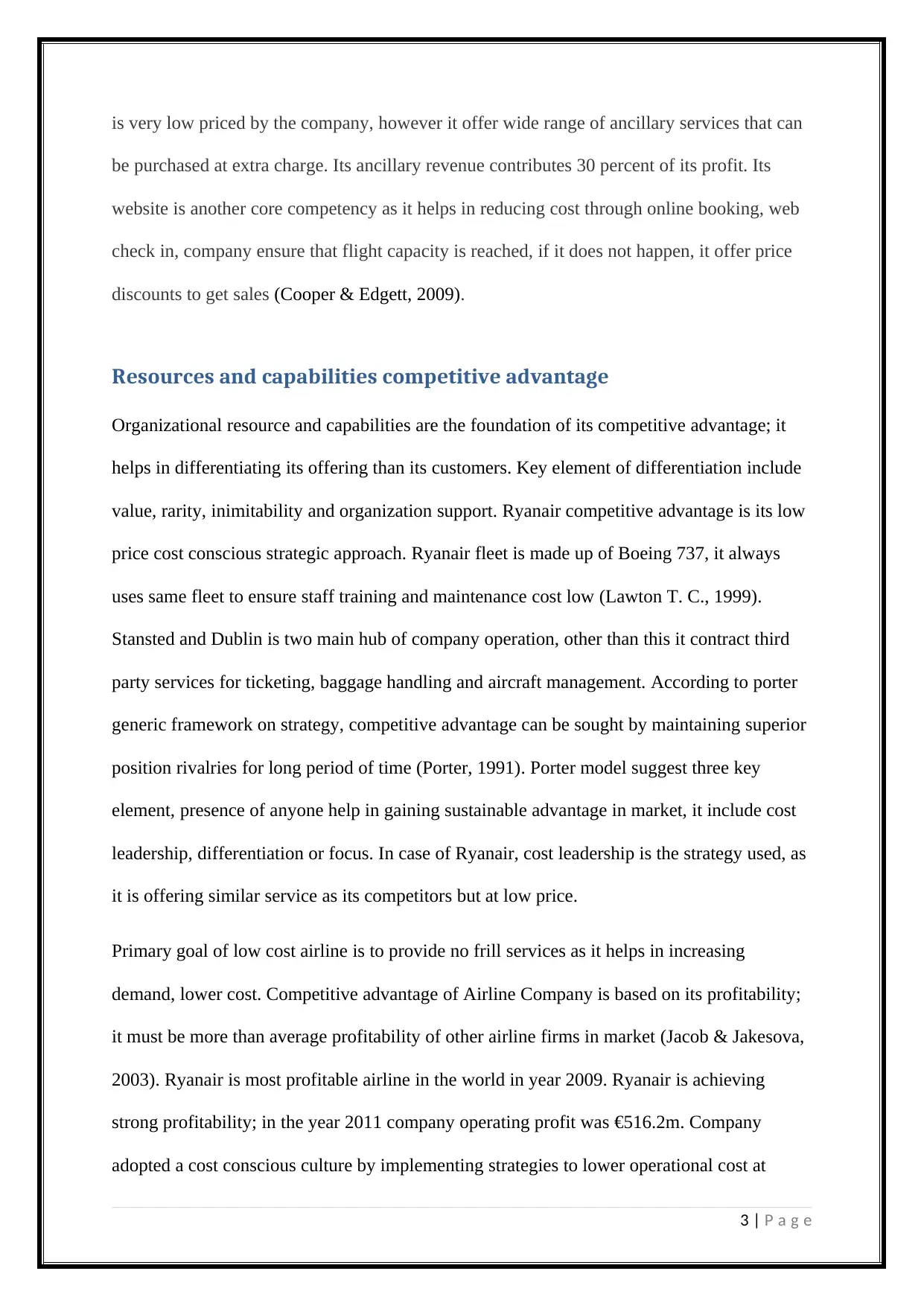
is very low priced by the company, however it offer wide range of ancillary services that can
be purchased at extra charge. Its ancillary revenue contributes 30 percent of its profit. Its
website is another core competency as it helps in reducing cost through online booking, web
check in, company ensure that flight capacity is reached, if it does not happen, it offer price
discounts to get sales (Cooper & Edgett, 2009).
Resources and capabilities competitive advantage
Organizational resource and capabilities are the foundation of its competitive advantage; it
helps in differentiating its offering than its customers. Key element of differentiation include
value, rarity, inimitability and organization support. Ryanair competitive advantage is its low
price cost conscious strategic approach. Ryanair fleet is made up of Boeing 737, it always
uses same fleet to ensure staff training and maintenance cost low (Lawton T. C., 1999).
Stansted and Dublin is two main hub of company operation, other than this it contract third
party services for ticketing, baggage handling and aircraft management. According to porter
generic framework on strategy, competitive advantage can be sought by maintaining superior
position rivalries for long period of time (Porter, 1991). Porter model suggest three key
element, presence of anyone help in gaining sustainable advantage in market, it include cost
leadership, differentiation or focus. In case of Ryanair, cost leadership is the strategy used, as
it is offering similar service as its competitors but at low price.
Primary goal of low cost airline is to provide no frill services as it helps in increasing
demand, lower cost. Competitive advantage of Airline Company is based on its profitability;
it must be more than average profitability of other airline firms in market (Jacob & Jakesova,
2003). Ryanair is most profitable airline in the world in year 2009. Ryanair is achieving
strong profitability; in the year 2011 company operating profit was €516.2m. Company
adopted a cost conscious culture by implementing strategies to lower operational cost at
3 | P a g e
be purchased at extra charge. Its ancillary revenue contributes 30 percent of its profit. Its
website is another core competency as it helps in reducing cost through online booking, web
check in, company ensure that flight capacity is reached, if it does not happen, it offer price
discounts to get sales (Cooper & Edgett, 2009).
Resources and capabilities competitive advantage
Organizational resource and capabilities are the foundation of its competitive advantage; it
helps in differentiating its offering than its customers. Key element of differentiation include
value, rarity, inimitability and organization support. Ryanair competitive advantage is its low
price cost conscious strategic approach. Ryanair fleet is made up of Boeing 737, it always
uses same fleet to ensure staff training and maintenance cost low (Lawton T. C., 1999).
Stansted and Dublin is two main hub of company operation, other than this it contract third
party services for ticketing, baggage handling and aircraft management. According to porter
generic framework on strategy, competitive advantage can be sought by maintaining superior
position rivalries for long period of time (Porter, 1991). Porter model suggest three key
element, presence of anyone help in gaining sustainable advantage in market, it include cost
leadership, differentiation or focus. In case of Ryanair, cost leadership is the strategy used, as
it is offering similar service as its competitors but at low price.
Primary goal of low cost airline is to provide no frill services as it helps in increasing
demand, lower cost. Competitive advantage of Airline Company is based on its profitability;
it must be more than average profitability of other airline firms in market (Jacob & Jakesova,
2003). Ryanair is most profitable airline in the world in year 2009. Ryanair is achieving
strong profitability; in the year 2011 company operating profit was €516.2m. Company
adopted a cost conscious culture by implementing strategies to lower operational cost at
3 | P a g e
⊘ This is a preview!⊘
Do you want full access?
Subscribe today to unlock all pages.

Trusted by 1+ million students worldwide
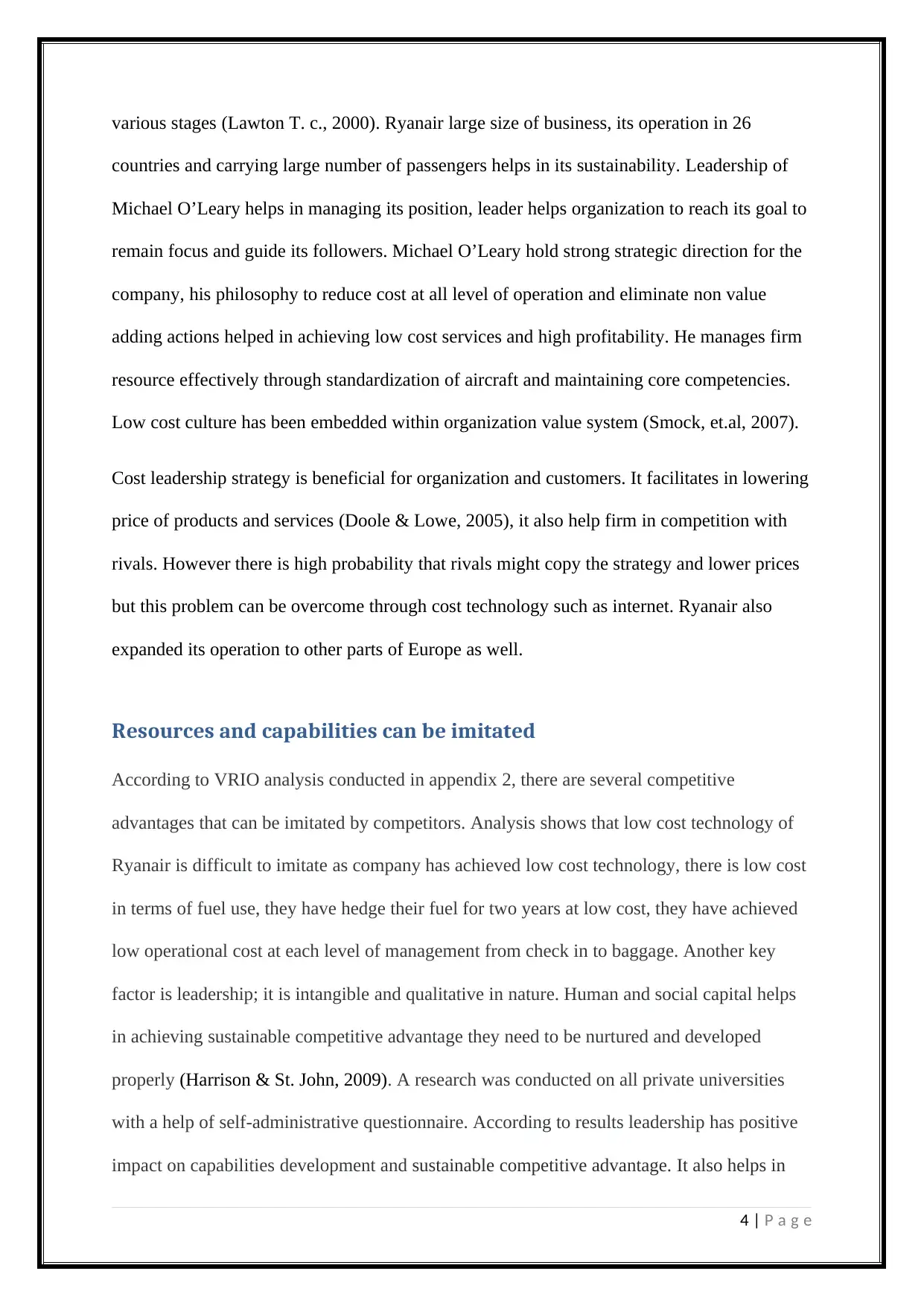
various stages (Lawton T. c., 2000). Ryanair large size of business, its operation in 26
countries and carrying large number of passengers helps in its sustainability. Leadership of
Michael O’Leary helps in managing its position, leader helps organization to reach its goal to
remain focus and guide its followers. Michael O’Leary hold strong strategic direction for the
company, his philosophy to reduce cost at all level of operation and eliminate non value
adding actions helped in achieving low cost services and high profitability. He manages firm
resource effectively through standardization of aircraft and maintaining core competencies.
Low cost culture has been embedded within organization value system (Smock, et.al, 2007).
Cost leadership strategy is beneficial for organization and customers. It facilitates in lowering
price of products and services (Doole & Lowe, 2005), it also help firm in competition with
rivals. However there is high probability that rivals might copy the strategy and lower prices
but this problem can be overcome through cost technology such as internet. Ryanair also
expanded its operation to other parts of Europe as well.
Resources and capabilities can be imitated
According to VRIO analysis conducted in appendix 2, there are several competitive
advantages that can be imitated by competitors. Analysis shows that low cost technology of
Ryanair is difficult to imitate as company has achieved low cost technology, there is low cost
in terms of fuel use, they have hedge their fuel for two years at low cost, they have achieved
low operational cost at each level of management from check in to baggage. Another key
factor is leadership; it is intangible and qualitative in nature. Human and social capital helps
in achieving sustainable competitive advantage they need to be nurtured and developed
properly (Harrison & St. John, 2009). A research was conducted on all private universities
with a help of self-administrative questionnaire. According to results leadership has positive
impact on capabilities development and sustainable competitive advantage. It also helps in
4 | P a g e
countries and carrying large number of passengers helps in its sustainability. Leadership of
Michael O’Leary helps in managing its position, leader helps organization to reach its goal to
remain focus and guide its followers. Michael O’Leary hold strong strategic direction for the
company, his philosophy to reduce cost at all level of operation and eliminate non value
adding actions helped in achieving low cost services and high profitability. He manages firm
resource effectively through standardization of aircraft and maintaining core competencies.
Low cost culture has been embedded within organization value system (Smock, et.al, 2007).
Cost leadership strategy is beneficial for organization and customers. It facilitates in lowering
price of products and services (Doole & Lowe, 2005), it also help firm in competition with
rivals. However there is high probability that rivals might copy the strategy and lower prices
but this problem can be overcome through cost technology such as internet. Ryanair also
expanded its operation to other parts of Europe as well.
Resources and capabilities can be imitated
According to VRIO analysis conducted in appendix 2, there are several competitive
advantages that can be imitated by competitors. Analysis shows that low cost technology of
Ryanair is difficult to imitate as company has achieved low cost technology, there is low cost
in terms of fuel use, they have hedge their fuel for two years at low cost, they have achieved
low operational cost at each level of management from check in to baggage. Another key
factor is leadership; it is intangible and qualitative in nature. Human and social capital helps
in achieving sustainable competitive advantage they need to be nurtured and developed
properly (Harrison & St. John, 2009). A research was conducted on all private universities
with a help of self-administrative questionnaire. According to results leadership has positive
impact on capabilities development and sustainable competitive advantage. It also helps in
4 | P a g e
Paraphrase This Document
Need a fresh take? Get an instant paraphrase of this document with our AI Paraphraser
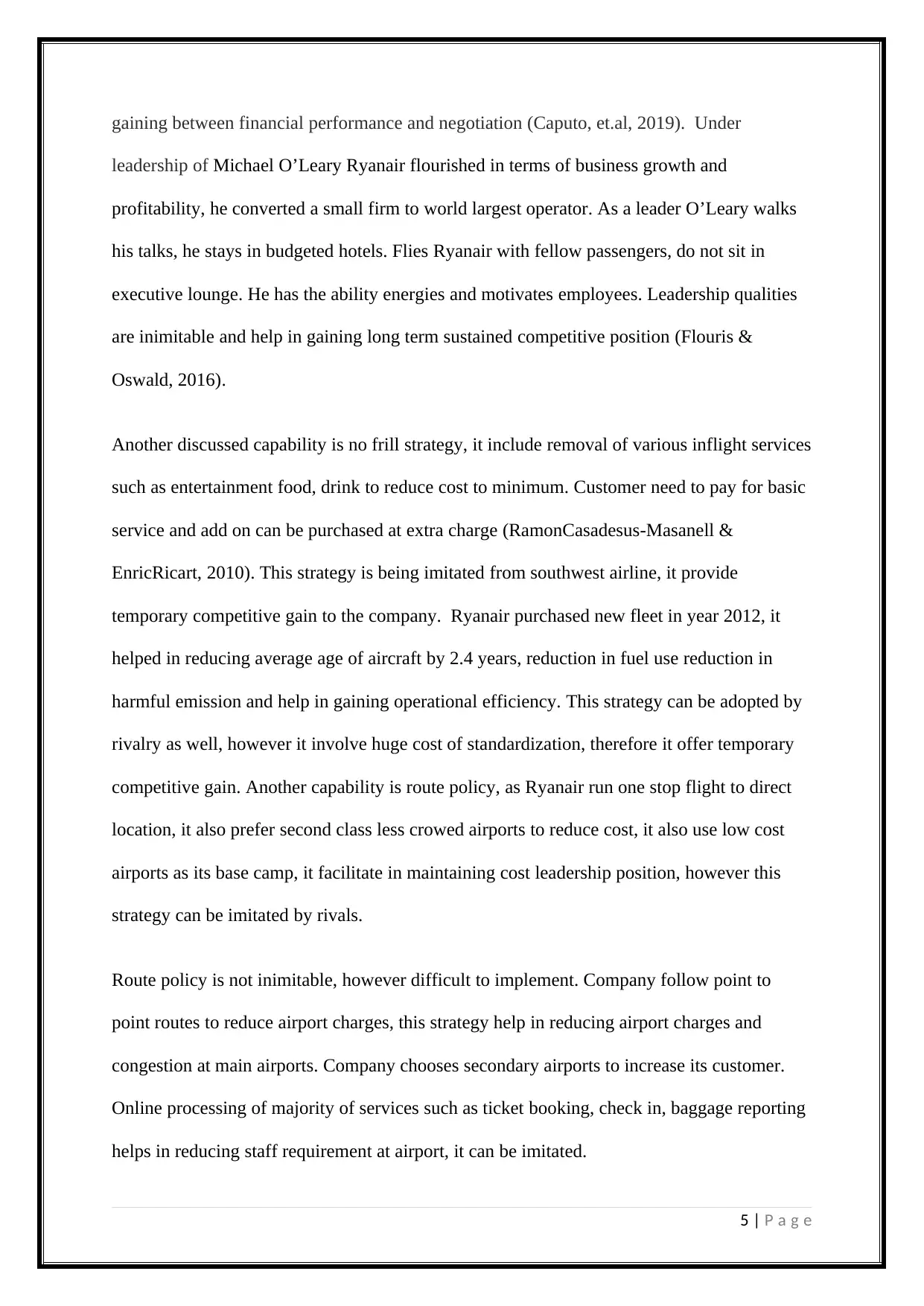
gaining between financial performance and negotiation (Caputo, et.al, 2019). Under
leadership of Michael O’Leary Ryanair flourished in terms of business growth and
profitability, he converted a small firm to world largest operator. As a leader O’Leary walks
his talks, he stays in budgeted hotels. Flies Ryanair with fellow passengers, do not sit in
executive lounge. He has the ability energies and motivates employees. Leadership qualities
are inimitable and help in gaining long term sustained competitive position (Flouris &
Oswald, 2016).
Another discussed capability is no frill strategy, it include removal of various inflight services
such as entertainment food, drink to reduce cost to minimum. Customer need to pay for basic
service and add on can be purchased at extra charge (RamonCasadesus-Masanell &
EnricRicart, 2010). This strategy is being imitated from southwest airline, it provide
temporary competitive gain to the company. Ryanair purchased new fleet in year 2012, it
helped in reducing average age of aircraft by 2.4 years, reduction in fuel use reduction in
harmful emission and help in gaining operational efficiency. This strategy can be adopted by
rivalry as well, however it involve huge cost of standardization, therefore it offer temporary
competitive gain. Another capability is route policy, as Ryanair run one stop flight to direct
location, it also prefer second class less crowed airports to reduce cost, it also use low cost
airports as its base camp, it facilitate in maintaining cost leadership position, however this
strategy can be imitated by rivals.
Route policy is not inimitable, however difficult to implement. Company follow point to
point routes to reduce airport charges, this strategy help in reducing airport charges and
congestion at main airports. Company chooses secondary airports to increase its customer.
Online processing of majority of services such as ticket booking, check in, baggage reporting
helps in reducing staff requirement at airport, it can be imitated.
5 | P a g e
leadership of Michael O’Leary Ryanair flourished in terms of business growth and
profitability, he converted a small firm to world largest operator. As a leader O’Leary walks
his talks, he stays in budgeted hotels. Flies Ryanair with fellow passengers, do not sit in
executive lounge. He has the ability energies and motivates employees. Leadership qualities
are inimitable and help in gaining long term sustained competitive position (Flouris &
Oswald, 2016).
Another discussed capability is no frill strategy, it include removal of various inflight services
such as entertainment food, drink to reduce cost to minimum. Customer need to pay for basic
service and add on can be purchased at extra charge (RamonCasadesus-Masanell &
EnricRicart, 2010). This strategy is being imitated from southwest airline, it provide
temporary competitive gain to the company. Ryanair purchased new fleet in year 2012, it
helped in reducing average age of aircraft by 2.4 years, reduction in fuel use reduction in
harmful emission and help in gaining operational efficiency. This strategy can be adopted by
rivalry as well, however it involve huge cost of standardization, therefore it offer temporary
competitive gain. Another capability is route policy, as Ryanair run one stop flight to direct
location, it also prefer second class less crowed airports to reduce cost, it also use low cost
airports as its base camp, it facilitate in maintaining cost leadership position, however this
strategy can be imitated by rivals.
Route policy is not inimitable, however difficult to implement. Company follow point to
point routes to reduce airport charges, this strategy help in reducing airport charges and
congestion at main airports. Company chooses secondary airports to increase its customer.
Online processing of majority of services such as ticket booking, check in, baggage reporting
helps in reducing staff requirement at airport, it can be imitated.
5 | P a g e
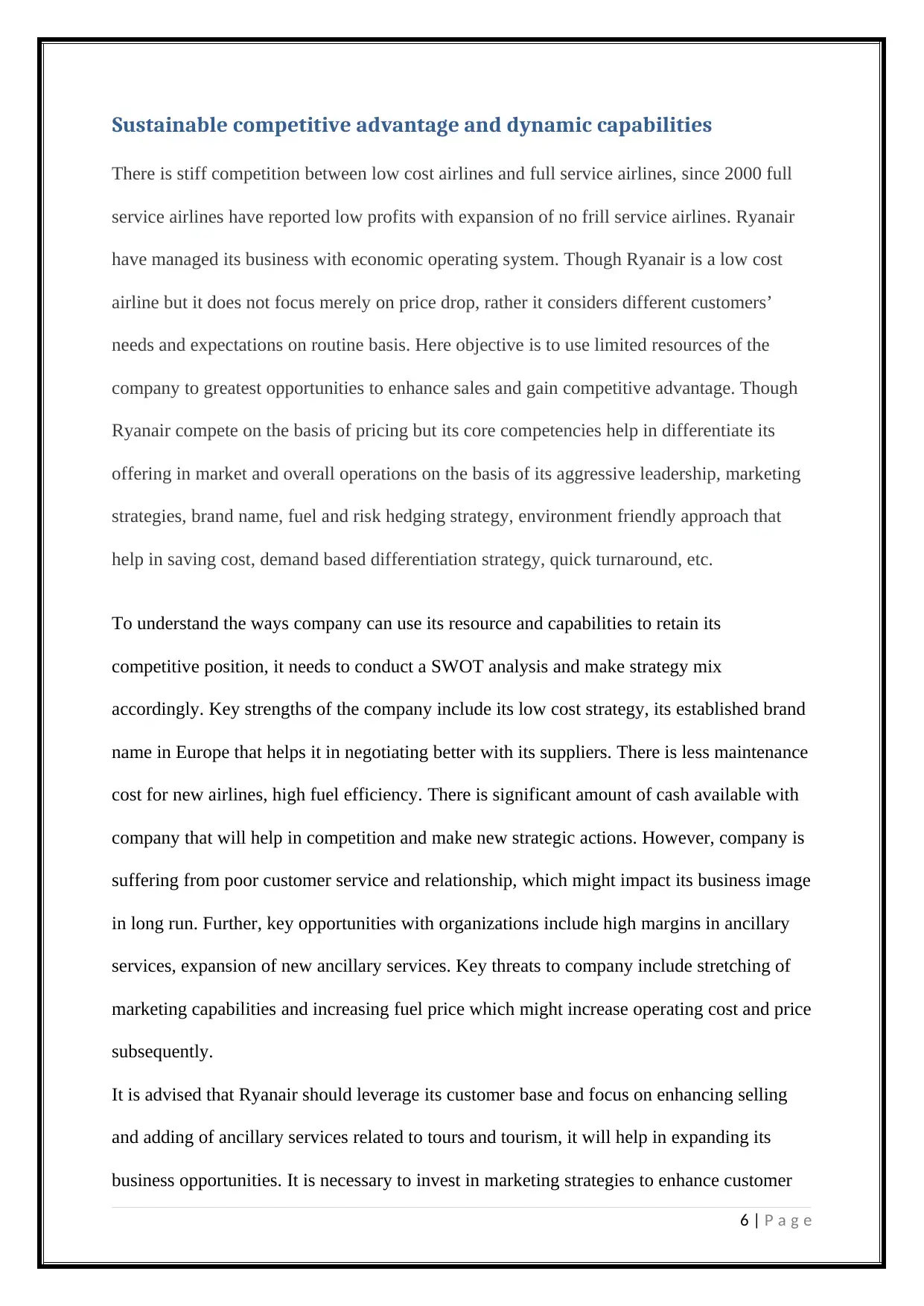
Sustainable competitive advantage and dynamic capabilities
There is stiff competition between low cost airlines and full service airlines, since 2000 full
service airlines have reported low profits with expansion of no frill service airlines. Ryanair
have managed its business with economic operating system. Though Ryanair is a low cost
airline but it does not focus merely on price drop, rather it considers different customers’
needs and expectations on routine basis. Here objective is to use limited resources of the
company to greatest opportunities to enhance sales and gain competitive advantage. Though
Ryanair compete on the basis of pricing but its core competencies help in differentiate its
offering in market and overall operations on the basis of its aggressive leadership, marketing
strategies, brand name, fuel and risk hedging strategy, environment friendly approach that
help in saving cost, demand based differentiation strategy, quick turnaround, etc.
To understand the ways company can use its resource and capabilities to retain its
competitive position, it needs to conduct a SWOT analysis and make strategy mix
accordingly. Key strengths of the company include its low cost strategy, its established brand
name in Europe that helps it in negotiating better with its suppliers. There is less maintenance
cost for new airlines, high fuel efficiency. There is significant amount of cash available with
company that will help in competition and make new strategic actions. However, company is
suffering from poor customer service and relationship, which might impact its business image
in long run. Further, key opportunities with organizations include high margins in ancillary
services, expansion of new ancillary services. Key threats to company include stretching of
marketing capabilities and increasing fuel price which might increase operating cost and price
subsequently.
It is advised that Ryanair should leverage its customer base and focus on enhancing selling
and adding of ancillary services related to tours and tourism, it will help in expanding its
business opportunities. It is necessary to invest in marketing strategies to enhance customer
6 | P a g e
There is stiff competition between low cost airlines and full service airlines, since 2000 full
service airlines have reported low profits with expansion of no frill service airlines. Ryanair
have managed its business with economic operating system. Though Ryanair is a low cost
airline but it does not focus merely on price drop, rather it considers different customers’
needs and expectations on routine basis. Here objective is to use limited resources of the
company to greatest opportunities to enhance sales and gain competitive advantage. Though
Ryanair compete on the basis of pricing but its core competencies help in differentiate its
offering in market and overall operations on the basis of its aggressive leadership, marketing
strategies, brand name, fuel and risk hedging strategy, environment friendly approach that
help in saving cost, demand based differentiation strategy, quick turnaround, etc.
To understand the ways company can use its resource and capabilities to retain its
competitive position, it needs to conduct a SWOT analysis and make strategy mix
accordingly. Key strengths of the company include its low cost strategy, its established brand
name in Europe that helps it in negotiating better with its suppliers. There is less maintenance
cost for new airlines, high fuel efficiency. There is significant amount of cash available with
company that will help in competition and make new strategic actions. However, company is
suffering from poor customer service and relationship, which might impact its business image
in long run. Further, key opportunities with organizations include high margins in ancillary
services, expansion of new ancillary services. Key threats to company include stretching of
marketing capabilities and increasing fuel price which might increase operating cost and price
subsequently.
It is advised that Ryanair should leverage its customer base and focus on enhancing selling
and adding of ancillary services related to tours and tourism, it will help in expanding its
business opportunities. It is necessary to invest in marketing strategies to enhance customer
6 | P a g e
⊘ This is a preview!⊘
Do you want full access?
Subscribe today to unlock all pages.

Trusted by 1+ million students worldwide
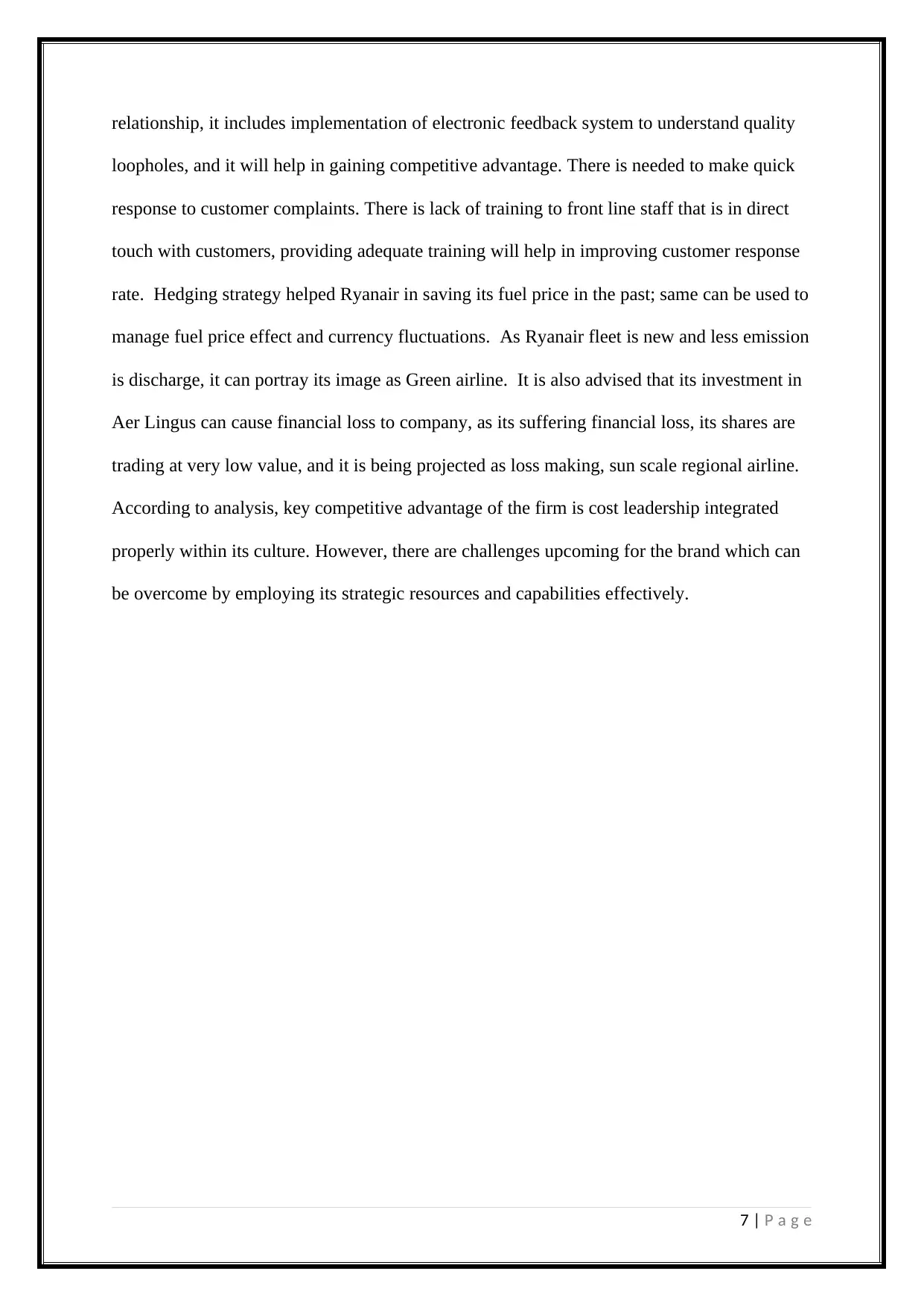
relationship, it includes implementation of electronic feedback system to understand quality
loopholes, and it will help in gaining competitive advantage. There is needed to make quick
response to customer complaints. There is lack of training to front line staff that is in direct
touch with customers, providing adequate training will help in improving customer response
rate. Hedging strategy helped Ryanair in saving its fuel price in the past; same can be used to
manage fuel price effect and currency fluctuations. As Ryanair fleet is new and less emission
is discharge, it can portray its image as Green airline. It is also advised that its investment in
Aer Lingus can cause financial loss to company, as its suffering financial loss, its shares are
trading at very low value, and it is being projected as loss making, sun scale regional airline.
According to analysis, key competitive advantage of the firm is cost leadership integrated
properly within its culture. However, there are challenges upcoming for the brand which can
be overcome by employing its strategic resources and capabilities effectively.
7 | P a g e
loopholes, and it will help in gaining competitive advantage. There is needed to make quick
response to customer complaints. There is lack of training to front line staff that is in direct
touch with customers, providing adequate training will help in improving customer response
rate. Hedging strategy helped Ryanair in saving its fuel price in the past; same can be used to
manage fuel price effect and currency fluctuations. As Ryanair fleet is new and less emission
is discharge, it can portray its image as Green airline. It is also advised that its investment in
Aer Lingus can cause financial loss to company, as its suffering financial loss, its shares are
trading at very low value, and it is being projected as loss making, sun scale regional airline.
According to analysis, key competitive advantage of the firm is cost leadership integrated
properly within its culture. However, there are challenges upcoming for the brand which can
be overcome by employing its strategic resources and capabilities effectively.
7 | P a g e
Paraphrase This Document
Need a fresh take? Get an instant paraphrase of this document with our AI Paraphraser
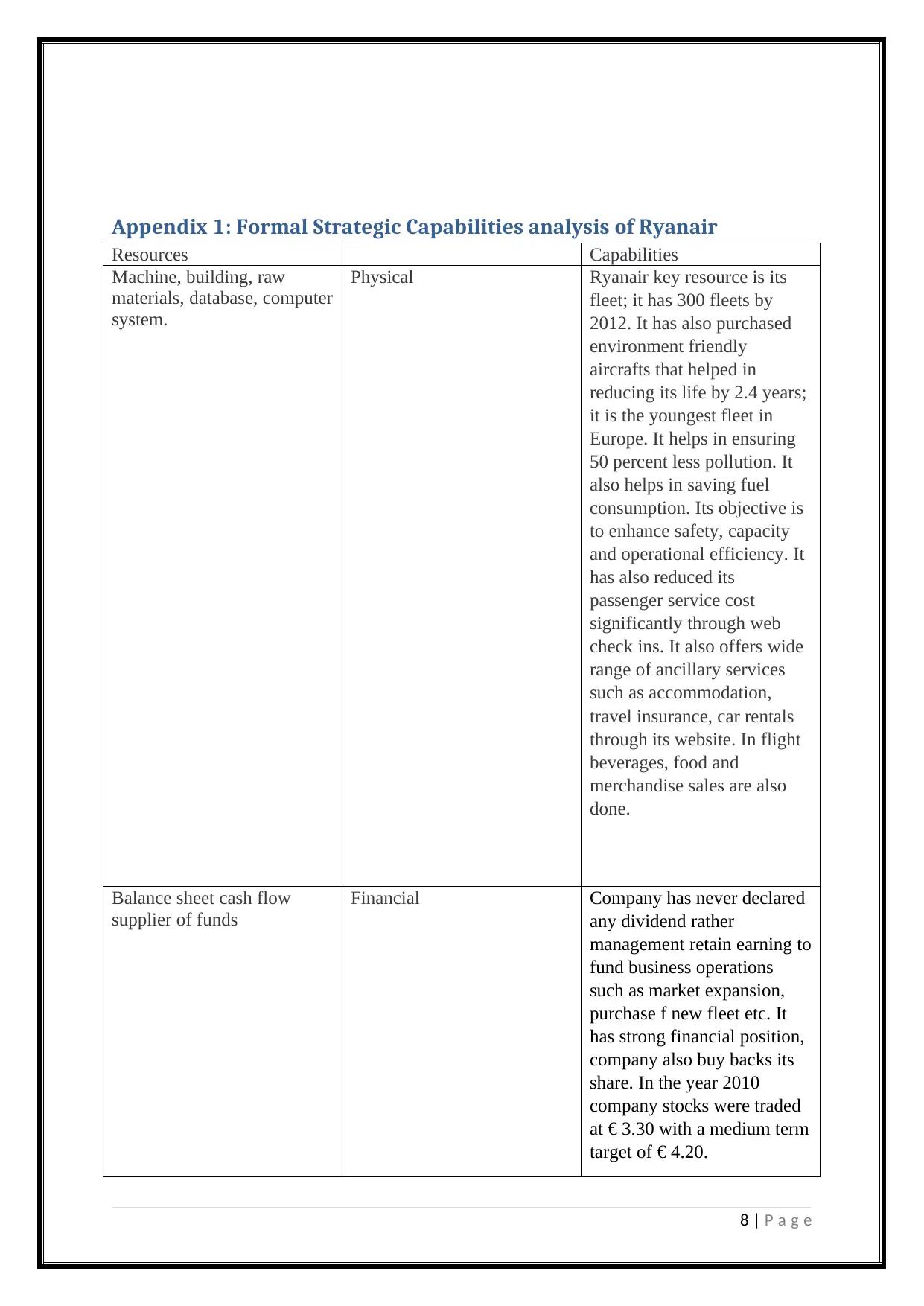
Appendix 1: Formal Strategic Capabilities analysis of Ryanair
Resources Capabilities
Machine, building, raw
materials, database, computer
system.
Physical Ryanair key resource is its
fleet; it has 300 fleets by
2012. It has also purchased
environment friendly
aircrafts that helped in
reducing its life by 2.4 years;
it is the youngest fleet in
Europe. It helps in ensuring
50 percent less pollution. It
also helps in saving fuel
consumption. Its objective is
to enhance safety, capacity
and operational efficiency. It
has also reduced its
passenger service cost
significantly through web
check ins. It also offers wide
range of ancillary services
such as accommodation,
travel insurance, car rentals
through its website. In flight
beverages, food and
merchandise sales are also
done.
Balance sheet cash flow
supplier of funds
Financial Company has never declared
any dividend rather
management retain earning to
fund business operations
such as market expansion,
purchase f new fleet etc. It
has strong financial position,
company also buy backs its
share. In the year 2010
company stocks were traded
at € 3.30 with a medium term
target of € 4.20.
8 | P a g e
Resources Capabilities
Machine, building, raw
materials, database, computer
system.
Physical Ryanair key resource is its
fleet; it has 300 fleets by
2012. It has also purchased
environment friendly
aircrafts that helped in
reducing its life by 2.4 years;
it is the youngest fleet in
Europe. It helps in ensuring
50 percent less pollution. It
also helps in saving fuel
consumption. Its objective is
to enhance safety, capacity
and operational efficiency. It
has also reduced its
passenger service cost
significantly through web
check ins. It also offers wide
range of ancillary services
such as accommodation,
travel insurance, car rentals
through its website. In flight
beverages, food and
merchandise sales are also
done.
Balance sheet cash flow
supplier of funds
Financial Company has never declared
any dividend rather
management retain earning to
fund business operations
such as market expansion,
purchase f new fleet etc. It
has strong financial position,
company also buy backs its
share. In the year 2010
company stocks were traded
at € 3.30 with a medium term
target of € 4.20.
8 | P a g e
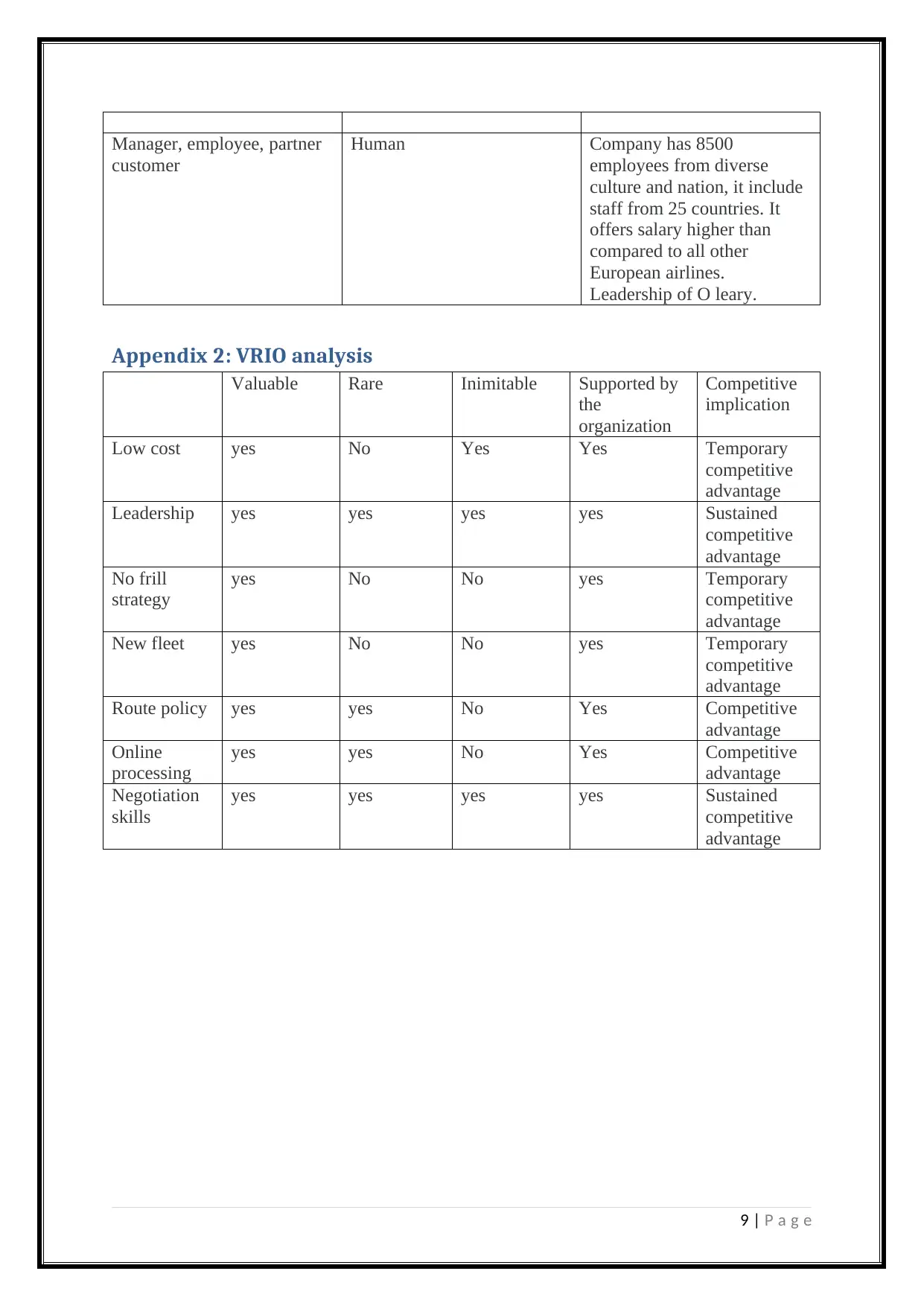
Manager, employee, partner
customer
Human Company has 8500
employees from diverse
culture and nation, it include
staff from 25 countries. It
offers salary higher than
compared to all other
European airlines.
Leadership of O leary.
Appendix 2: VRIO analysis
Valuable Rare Inimitable Supported by
the
organization
Competitive
implication
Low cost yes No Yes Yes Temporary
competitive
advantage
Leadership yes yes yes yes Sustained
competitive
advantage
No frill
strategy
yes No No yes Temporary
competitive
advantage
New fleet yes No No yes Temporary
competitive
advantage
Route policy yes yes No Yes Competitive
advantage
Online
processing
yes yes No Yes Competitive
advantage
Negotiation
skills
yes yes yes yes Sustained
competitive
advantage
9 | P a g e
customer
Human Company has 8500
employees from diverse
culture and nation, it include
staff from 25 countries. It
offers salary higher than
compared to all other
European airlines.
Leadership of O leary.
Appendix 2: VRIO analysis
Valuable Rare Inimitable Supported by
the
organization
Competitive
implication
Low cost yes No Yes Yes Temporary
competitive
advantage
Leadership yes yes yes yes Sustained
competitive
advantage
No frill
strategy
yes No No yes Temporary
competitive
advantage
New fleet yes No No yes Temporary
competitive
advantage
Route policy yes yes No Yes Competitive
advantage
Online
processing
yes yes No Yes Competitive
advantage
Negotiation
skills
yes yes yes yes Sustained
competitive
advantage
9 | P a g e
⊘ This is a preview!⊘
Do you want full access?
Subscribe today to unlock all pages.

Trusted by 1+ million students worldwide
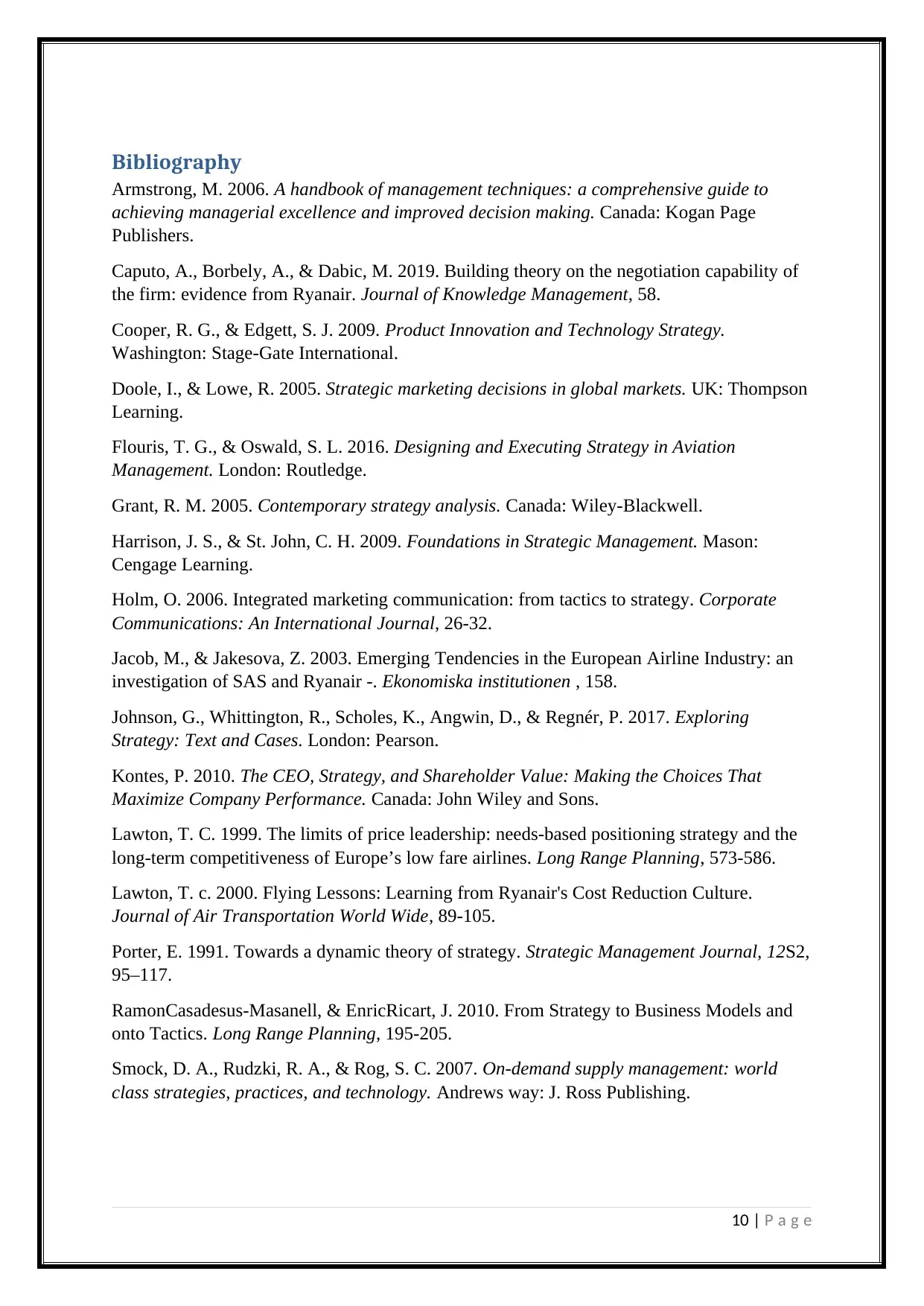
Bibliography
Armstrong, M. 2006. A handbook of management techniques: a comprehensive guide to
achieving managerial excellence and improved decision making. Canada: Kogan Page
Publishers.
Caputo, A., Borbely, A., & Dabic, M. 2019. Building theory on the negotiation capability of
the firm: evidence from Ryanair. Journal of Knowledge Management, 58.
Cooper, R. G., & Edgett, S. J. 2009. Product Innovation and Technology Strategy.
Washington: Stage-Gate International.
Doole, I., & Lowe, R. 2005. Strategic marketing decisions in global markets. UK: Thompson
Learning.
Flouris, T. G., & Oswald, S. L. 2016. Designing and Executing Strategy in Aviation
Management. London: Routledge.
Grant, R. M. 2005. Contemporary strategy analysis. Canada: Wiley-Blackwell.
Harrison, J. S., & St. John, C. H. 2009. Foundations in Strategic Management. Mason:
Cengage Learning.
Holm, O. 2006. Integrated marketing communication: from tactics to strategy. Corporate
Communications: An International Journal, 26-32.
Jacob, M., & Jakesova, Z. 2003. Emerging Tendencies in the European Airline Industry: an
investigation of SAS and Ryanair -. Ekonomiska institutionen , 158.
Johnson, G., Whittington, R., Scholes, K., Angwin, D., & Regnér, P. 2017. Exploring
Strategy: Text and Cases. London: Pearson.
Kontes, P. 2010. The CEO, Strategy, and Shareholder Value: Making the Choices That
Maximize Company Performance. Canada: John Wiley and Sons.
Lawton, T. C. 1999. The limits of price leadership: needs-based positioning strategy and the
long-term competitiveness of Europe’s low fare airlines. Long Range Planning, 573-586.
Lawton, T. c. 2000. Flying Lessons: Learning from Ryanair's Cost Reduction Culture.
Journal of Air Transportation World Wide, 89-105.
Porter, E. 1991. Towards a dynamic theory of strategy. Strategic Management Journal, 12S2,
95–117.
RamonCasadesus-Masanell, & EnricRicart, J. 2010. From Strategy to Business Models and
onto Tactics. Long Range Planning, 195-205.
Smock, D. A., Rudzki, R. A., & Rog, S. C. 2007. On-demand supply management: world
class strategies, practices, and technology. Andrews way: J. Ross Publishing.
10 | P a g e
Armstrong, M. 2006. A handbook of management techniques: a comprehensive guide to
achieving managerial excellence and improved decision making. Canada: Kogan Page
Publishers.
Caputo, A., Borbely, A., & Dabic, M. 2019. Building theory on the negotiation capability of
the firm: evidence from Ryanair. Journal of Knowledge Management, 58.
Cooper, R. G., & Edgett, S. J. 2009. Product Innovation and Technology Strategy.
Washington: Stage-Gate International.
Doole, I., & Lowe, R. 2005. Strategic marketing decisions in global markets. UK: Thompson
Learning.
Flouris, T. G., & Oswald, S. L. 2016. Designing and Executing Strategy in Aviation
Management. London: Routledge.
Grant, R. M. 2005. Contemporary strategy analysis. Canada: Wiley-Blackwell.
Harrison, J. S., & St. John, C. H. 2009. Foundations in Strategic Management. Mason:
Cengage Learning.
Holm, O. 2006. Integrated marketing communication: from tactics to strategy. Corporate
Communications: An International Journal, 26-32.
Jacob, M., & Jakesova, Z. 2003. Emerging Tendencies in the European Airline Industry: an
investigation of SAS and Ryanair -. Ekonomiska institutionen , 158.
Johnson, G., Whittington, R., Scholes, K., Angwin, D., & Regnér, P. 2017. Exploring
Strategy: Text and Cases. London: Pearson.
Kontes, P. 2010. The CEO, Strategy, and Shareholder Value: Making the Choices That
Maximize Company Performance. Canada: John Wiley and Sons.
Lawton, T. C. 1999. The limits of price leadership: needs-based positioning strategy and the
long-term competitiveness of Europe’s low fare airlines. Long Range Planning, 573-586.
Lawton, T. c. 2000. Flying Lessons: Learning from Ryanair's Cost Reduction Culture.
Journal of Air Transportation World Wide, 89-105.
Porter, E. 1991. Towards a dynamic theory of strategy. Strategic Management Journal, 12S2,
95–117.
RamonCasadesus-Masanell, & EnricRicart, J. 2010. From Strategy to Business Models and
onto Tactics. Long Range Planning, 195-205.
Smock, D. A., Rudzki, R. A., & Rog, S. C. 2007. On-demand supply management: world
class strategies, practices, and technology. Andrews way: J. Ross Publishing.
10 | P a g e
1 out of 10
Related Documents
Your All-in-One AI-Powered Toolkit for Academic Success.
+13062052269
info@desklib.com
Available 24*7 on WhatsApp / Email
![[object Object]](/_next/static/media/star-bottom.7253800d.svg)
Unlock your academic potential
Copyright © 2020–2026 A2Z Services. All Rights Reserved. Developed and managed by ZUCOL.





